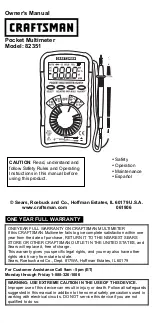
5
Measuring Resistance
See Figure
-5-
1.
Set the Function Switch to
Ω
.
2.
Select the desired RANGE (5XP-A, 15XP-A).
3.
Connect the test leads: Red to
E
, Black to
COM.
4.
Turn off power to the circuit being measured. Never measure resistance across
a voltage source or on a powered circuit.
5.
Discharge any capacitors that may influence the reading.
6.
Connect the test probes across the resistance.
7.
Read the display. If
0o
appears on the highest range, the resistance is too large
to be measured or the circuit is an open circuit.
8.
(15XP-A) The 2000 M
Ω
range has a fixed 10-count offset in the reading. For
example, when measuring 1100 M
Ω
, the display reads 1110. The 10 residual
must be subtracted to obtain the actual value of 1100 M
Ω
Testing for Continuity
See Figure
-6-
1.
Set the Function Switch to
R
.
2.
Connect the test leads: Red to
E
, Black to
COM.
3.
Turn off power to the circuit being measured.
4.
Discharge any capacitors that may influence the reading.
5.
Connect the test probes across the resistance or the two points of test.
6.
Listen for the tone that indicates continuity (< 40
Ω
).
Testing Diodes
See Figure
-7-
1.
Set the Function Switch to
G
.
2.
Connect the test leads: Red to
E
, Black to
COM.
3.
Turn off power to the circuit being measured.
4.
Free at least one end of the diode from the circuit.
5.
Connect the test probes across the diode.
6.
Read the display. A good diode has a forward voltage drop of about 0.6 V. An
open or reverse biased diode will read
0o
.
Measuring Capacitance (35XP-A only)
See Figure
-8-
1.
Set the Function Switch to the
P
function.
2.
Connect the test leads: Red to
h
,
Black to
COM.
4.
Turn off power to the circuit being measured.
5.
Discharge the capacitor using a 100 k
Ω
resistor.
6.
Free at least one end of the capacitor from the circuit.
7.
Connect the test probes across the capacitor.
8.
Read the display.












































